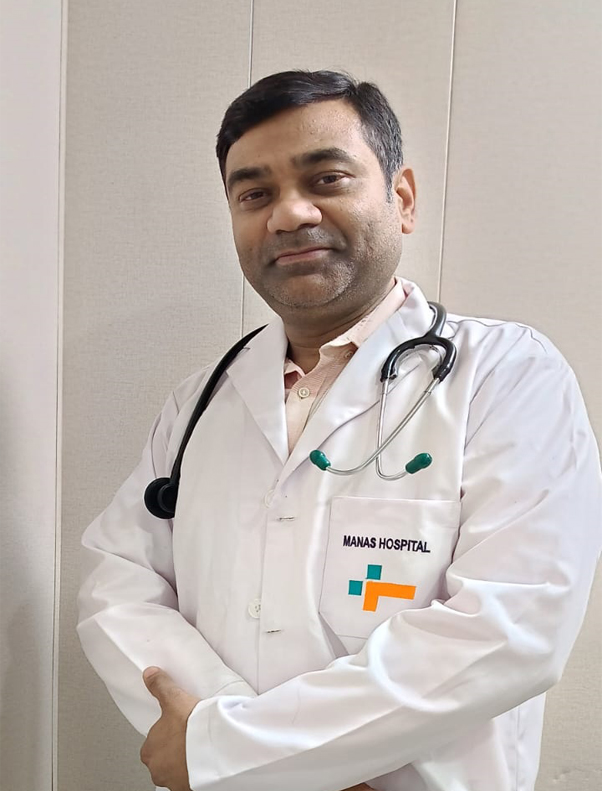
ENT/ Otorhinolaryngologist
MBBS, Diploma in Otorhinolaryngology (DLO), DNB - ENT, 15+ Years of Experience
At Manas Hospital, we understand the significance of ear, nose, and throat (ENT) health in overall well-being and quality of life. Our Department of Otorhinolaryngology, commonly known as ENT , is committed to providing comprehensive care for patients with disorders of the ear, nose, throat, head, and neck. Led by a team of experienced ENT specialists, we offer advanced diagnostic services, innovative treatments, and compassionate care to address a wide range of ENT conditions.
Our mission is to improve the quality of life for patients with ENT disorders through excellence in patient care, education, and research. We are dedicated to providing personalized, evidence-based treatment plans while prioritizing patient comfort, safety, and satisfaction.
All aspects of E.N.T. Surgery, Head & Neck Surgery, Base-skull Surgery, E.N.T. Endoscopic Surgery are managed with the help of state of the art equipment. Microsurgery of Ear & Larynx, Endoscopic Sinus Surgery, Flexible & Rigid Endoscopy, E.N.T. Cancer Surgery, Functional E.N.T. Surgery are also pursued.
The facilities available in the Department of Otorhinolaryngology ( ENT) provides a range of services through its dedicated , qualified and experienced ENT surgeons.
Investigative facilities like Audiometry and Emittance are also available which help in managing and rehabilitation of patients of deafness, mutism, voice disorders and those with behavioural problems.
If you or a loved one requires expert care for ear, nose, and throat disorders, we invite you to schedule a consultation with our Department of Otorhinolaryngology [ENT] Surgery at Manas Hospital, Noida. Our experienced ENT specialists are here to provide you with compassionate, personalized care to support your ENT health and well-being. Contact us today to book your appointment. We look forward to serving you!




Nosebleeds can occur due to many reasons; the most common being changes in weather. Normally nosebleeds occur in hot, dry climates or bitter cold environments.Some of the other causes for nosebleeds are:
• Infection
• Self-induced nose picking
• Use of blood thinning medications
• Excessive intake of Alcohol
• Hypertension
The different tests that are conducted to assess the problem are:
• Auditory brain implant (ABR) or electrocochleography (ECochG).
• Behavioural testing – using tests such as visual response audiometry.
• Older children with post lingual deafness, standard pure tone and aided free field tests are performed along with speech discrimination.
• An aided audiogram.
Surgical and non-surgical treatments are performed based on the severity of the case. Below mentioned are a few procedures that are performed by an ENT specialist.
• Adenoidectomy and Tonsillectomy – These are the two most common procedures performed especially in children. Adenoidectomy is the procedure to remove the adenoids (small lumps of lymphoid tissue located close to the nasal cavity where the nose blends with the throat). Tonsillectomy is the procedure when the tonsils are removed. Tonsillectomy may be performed for reasons when the upper airway is partially or completely blocked by the tonsils.
• Myringotomy tube insertion – It is one of the most common ear surgeries. In this a tube is inserted to prevent recurrent infections of the inner ear. In case any fluid is accumulated inside the ear, the insertions are made inside the ear to drain out the fluid from the middle ear to avoid hearing imbalance.
• Septoplasty – This is a procedure used to straighten the nasal septum (a separating structure in the nasal cavity). The abnormality or crookedness of the septum could impair one’s ability to breathe. Septoplasty is done through the nasal openings and does not require any external incision.
• Sinus surgery – Sinus surgery is done to remove and blockage in the sinus area or to
enlarge the sinus openings for easier drainage.
• Tracheotomy – This procedure is used in cases where patients’ respiratory ability is
seriously impaired and air cannot reach the lungs. A small opening is made in the trachea to allow air to reach the lungs.
It is a surgically implanted electronic device that is used by people who receive minimal or no benefit from conventional hearing aid. Often referred to as bionic ear, it works using special technologies to take the place of non-working parts in the ear. It is capable of converting sound to electronic signal, which stimulates the 8th nerve.Cochlear implants provide a heightened sense of sound to adults and children with profound hearing loss. The implants bypass the damaged hair cells in the inner ear and directly stimulate the auditory nerve to send information to the nerve. These are not responsible for restoring or creating new hearing.
Not all who struggle to hear require a cochlear implant. Some cases can be resolved with the help of hearing aids. The device is best used for adults who have:
• Limited help from hearing aids
• Hearing loss after already learning speech and language
• A strong desire to hear better
• Severe to profound hearing loss in both ears
The major causes of nasal obstruction are as follows.
• Acute Sinusitis(sinus infection)
• Allergies
• Common cold
• Decongestion nasal spray overuse
• Deviated septum
• Dry air
• Stress
• Medications like high blood pressure drugs
Tonsillectomy refers to the procedure in which the tonsils are removed. There are several ways to remove the tonsils, the most common method being “cold knife (steel) dissection”. This technique involves the surgeon removing the tonsils with the help of a scalpel (sharp bladed instrument). Another common method used is “cauterization”. In this method, the tonsil tissues are completely burnt away. Other methods include the use of ultrasound to treat tonsils as well.
Sinusitis is a common condition where cavities around the nasal passage become inflamed and swollen. There are several causes for sinusitis. Some of the causes are mentioned below.
• Nasal obstruction causing difficulty in breathing
• Pain, tenderness around eyes, cheeks, nose.
• Reduced sense of smell and taste
• Cough that might worsen in the night
• Sore throat
Sinus surgery may be done when complications of sinusitis have occurred. Once sinusitis is diagnosed, the first step is to get it checked by a primary doctor. If the inflammation hasn’t reduced within 3 months, it is considered chronic sinusitis. In chronic sinusitis, the ENT doctor might suggest surgery in the sinus area. Hence,sinus surgery is not necessary in all cases unless the matter is severe.
There are surgeries performed which have an unexpected effect on the voice. Almost all surgical procedures will have a direct or indirect voice. Thus it is important to consider voice related side effects before undergoing any surgical procedure. Some surgeries which affect the voice are.
• Sinusitis
• Thyroid surgery
• Cervical spine surgery
Lifestyle changes post ENT Surgery depend upon the surgery you are undergoing but in general:
- taking food on time
- drinking lot of water
- avoid spicy food
- steam inhalation after nose surgery
- reducing weight

Never thought Manas Hospital could be such a support in my bad times. Got a fractured leg treated here. Thank you for all the support.

Thank you for saving my mother’s life. Highly recommended for emergencies near city centre area, Noida

Best Hospital, very affordable, patient centric, Dr.Naman is very good. Highly recommended for any kind of General Diseases and Maternity and Child Care. Thank you for all the support!